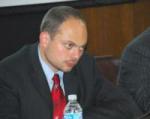Vladimir Kara Murza
For all the Kremlin’s efforts to remove checks on its power — from shutting down independent TV to turning parliament and courts into rubber stamps — there remains a factor it has been unable to deal with. Russia’s cautious integration into European political and judicial structures in the 1990s may be the one legacy of the Yeltsin years that has proved long-lasting. This week former Russian prime minister turned Kremlin critic Mikhail Kasyanov was in Washington to discuss the US-Russia “reset” and the opposition’s prospects for the 2011–12 elections. On the way here Mr. Kasyanov had a stop in Helsinki where he represented Russia at the 31st annual congress of the European Liberal Democrat and Reform party (ELDR).
http://www.worldaffairsjournal...
From the point of view of Russian authorities, the People’s Democratic Union (PDU) led by Mr. Kasyanov does not exist: it was denied official registration to keep it from taking part in elections (after individual member districts were abolished in 2004, only registered national lists are allowed to run). Yet in a courageous decision, ELDR — whose members include four European prime ministers, eight EU commissioners, and 75 legislators in the European parliament — disregarded Kremlin rules and accepted the PDU as a full participant, thus granting it Europe-wide recognition and establishing a precedent for bypassing repressive regulations imposed on opposition groups in authoritarian countries.
Europe can establish another precedent by actually compelling the Kremlin to legalize its political opponents. After his party was denied registration, Mr. Kasyanov appealed to the European Court of Human Rights (ECHR) in Strasbourg, which, after Russia joined the Council of Europe in 1996, became the country’s highest judicial authority. Unlike the G-8, which Kremlin leaders treat as a prestigious club for themselves, the Council of Europe actually benefits Russian citizens who have an opportunity to find justice outside of their own corrupt and manipulated court system. Russians lead among all Europeans in appealing to the Strasbourg court: as of December 31, 2009, there were 33,568 pending cases filed by Russian citizens against violations by their government. Thousands, including victims of “counter-terror” campaigns in the North Caucasus, find at the ECHR the justice and compensation denied to them at home.
In at least two instances, the European Court showed willingness to challenge Moscow on high-profile political cases. In 2004 it ruled that the arrest of media magnate Vladimir Gusinsky, whose NTV channel was later taken over by the state, violated the European Convention for the Protection of Human Rights and Fundamental Freedoms and ordered the Russian government to pay compensation. In a second case, earlier this year, the court’s Grand Chamber unanimously declared the ban on dual citizens holding elected office to be both “disproportionate” and in violation of the European Convention. This ban, introduced in 2006 by Vladimir Putin, deprived Russians holding dual citizenship or residence permits abroad (including, for example, prominent dissident Vladimir Bukovsky) of their electoral rights. The ECHR case was formally brought with regard to Moldova, not Russia, but what constitutes a violation of rights in one Council of Europe country clearly does so in another.
With parliamentary elections just a year away, Mikhail Kasyanov has requested the ECHR to treat his appeal as a priority case. At the same time he and other opposition leaders, notably Boris Nemtsov, are forming a new Popular Freedom party with the aim of taking part in the 2011 poll. However important the judicial proceedings, it is the political position of the West vis-à-vis Russian elections that may be crucial in opening up space for the opposition. Mr. Kasyanov’s main point during his visit to Washington was that a principled and unified stand by Western capitals in support of the Russian opposition’s right to participate in elections would make it difficult for the Kremlin to refuse.
Europe: Russia’s Last Chance
Rahvusvahelised uudised | 28 Oct 2010 | EWR
Rahvusvahelised uudised
TRENDING

























